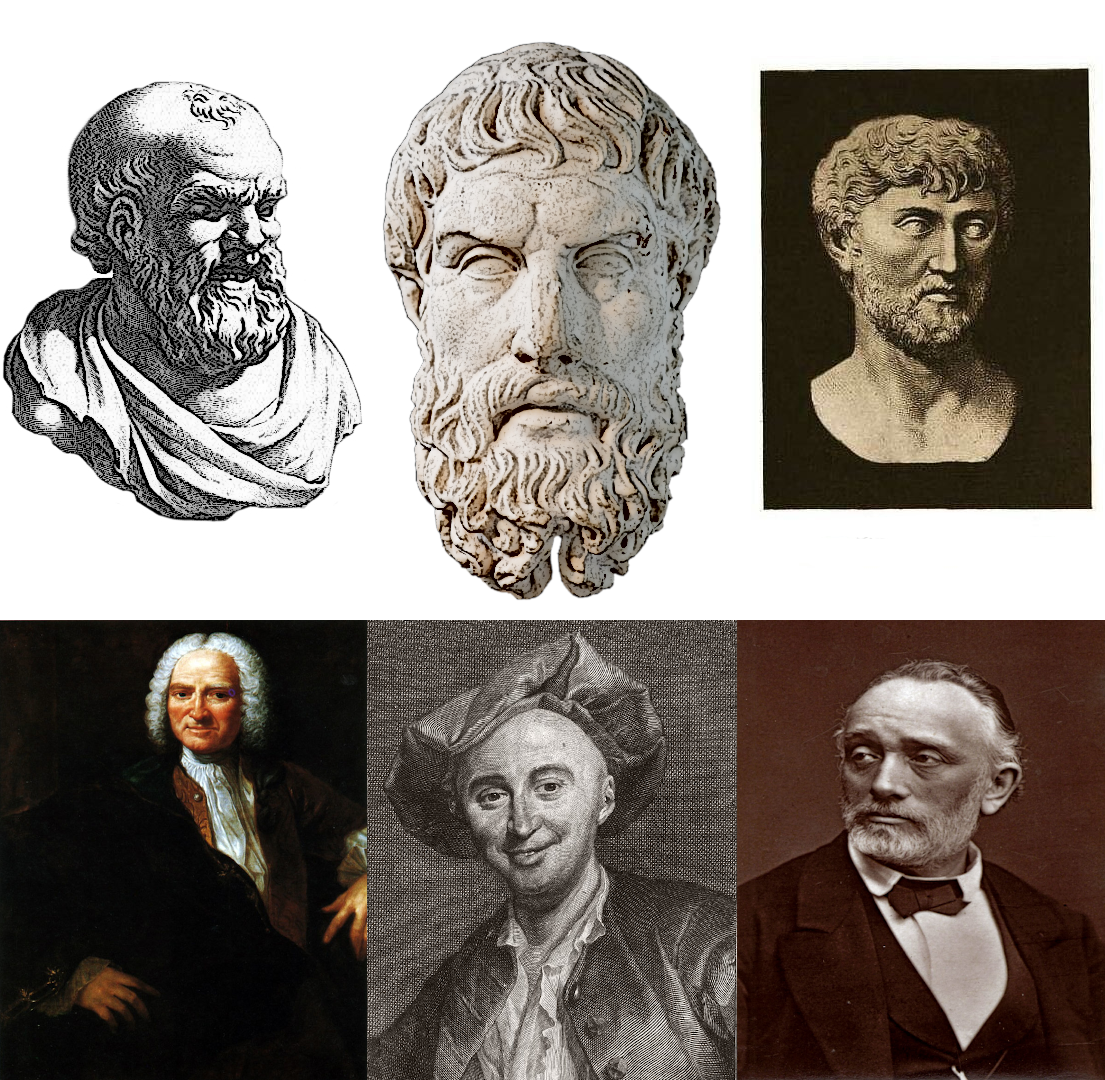
What is this philosophy called naturalism all about? Curious you spare some time to learn by hoping for an overview or maybe you probably already know what it is but would like to see how the style and idiosyncrasies of the author’s explanation compares to your own understanding?
In this article I am going to explain what naturalist philosophy is about from my years of reading about it. I will also help you understand it better by introducing some of the arguments and scepticism of this way of thinking as the article progresses.
But before that, I would like to say that I would rather call this philosophy Naturalism rather than its sister name; materialism. The trouble with this word is that it conjures up images of consumerism and the love of money, while at the same time ignoring the philosophical worldview itself.
The very brief history of naturalism
Alright, to start off, let’s take a glance at the historical development of western naturalism which arose with the Greek philosophical school: the atomists. Founded by the Greek philosopher Leukippos and developed by his philosophical successors, Democritus and Epicurus, they sought to explain everything by reducing the whole world of phenomena to being made up of indivisible building blocks called atoms. Later, during the Roman Republic, naturalism found its most prominent exponent in Lucretius who combined his epicurean philosophy with poetry in his well known work: On the Nature of Things, (Latin: De rerum natura). It should be made clear that the philosophical atoms of ancient atomism should not be confused with the modern scientific model of the atom.
“So potent was religion in persuading to do wrong” – Lucretius
Next during the Age of Enlightenment, naturalism found its significant development in French materialism embodied by a group of philosophers which defined it, such as Baron d’Holbach, Denis Diderot and Julien Offray de La Mettrie, all of whom wrote works contributing towards the development of naturalist philosophy. One argument posited from that time, for example, was La Mettrie critiquing Descartes mind body dualism, arguing that man was wholly physical and not made of two different things.
“There are no miracles in nature, except for those who have not sufficiently studied her.” – Baron d’Holbach
Then there was the Godfather of German scientific materialism, Ludwig Büchner. Who during the 19th century, published his best known work: Force and Matter (German: Kraft und Stoff). Which broadly applied the naturalist worldview touching on: the origin of life by abiogenesis, man, brain and mind, the idea of god, motion, free will and more. Some trivia, Force and Matter was briefly mentioned in the Russian novel: Fathers and Sons by Ivan Turgenev. In which the nihilist Bazarov recommends it highly as reading material.
“A shapeless matter is a nonentity, neither logically conceivable nor empirically present in nature.” – Ludwig Büchner
And now we have the naturalists of modern times, who are often scientists who have taken an interest in philosophy like Richard Dawkins and Sean Carroll for example.
Is naturalism simply atheism? What is naturalism?
Atheism is the disbelief in the existence of gods. Naturalism, although certainly atheist, is more than just that. One can be an atheist but accommodate the supernatural: such as with dualist philosophy or the sorts of spirituality that is absent of gods.
What makes Naturalism not just solely atheism and more is that it outright states that there is only one reality – the physical universe and its embodied laws of physics with nothing outside of it. Philosophies that propose that there is only one thing, no division or duality, one fundamental kind are called monistic philosophies. Monism then logically conflicts with dualism which contrarily states that reality is divided, that reality coexists with more than one fundamental; like mind and matter or supernatural and natural e.g.
So this proposal by naturalism, stating that only the physical is the one true fundamental reality that exists, makes it a monistic philosophy. Any philosophy supporting the idea that reality shares or coexists with something else other than the physical will conflict with naturalism.
All explanations of phenomena can be reduced to the material and physical. A naturalist thinks in terms of atoms, molecules, kinetic forces (heat), the fundamental forces – gravitational, electromagnetic, strong, weak and anything else that is of the physical and its physics.
Rejection of the supernatural
“That nothing’s brought forth by any supernatural power out of naught.” – Lucretius
Which leads us on to the consequence of Naturalism: the rejection of the supernatural. Nature as opposed to the supernatural, as the supernatural is something beyond nature and the laws of physics. Naturalism rejects the supernatural and is the arch opponent of supernaturalism.
The word supernatural tells us what it means without really needing to look up the dictionary. Super is a prefix word meaning ‘above’, so something that is supernatural is above nature and not constrained by the physical, but If the supernatural were something over and above the physical; then what was it doing before the physical?
Naturalists argue why can the spiritual, the transcendental, the divine agency be found in seizures, hallucinations, psychotic states and drug experiences? On the latter point, why does it require the ingestion of psychoactive molecules to elicit ‘spiritual experiences’?
Why is there this tendency that when the causes of something are unknown it must have something to do with the supernatural? It’s as if God or the supernatural dwell in the gaps of our knowledge. When for example, a natural event happened that was not well understood, the conclusions often rushed in to explain it were as being a sign, an omen, a message from God or other supernatural agencies such as angry spirits. The naturalistic attitude towards this is any explanation that invokes supernatural causes, disaster or otherwise, are met with skepticism or a counter explanation from a scientific viewpoint. Naturalism looks upon disasters as but simply matter in motion not requiring a divine or supernatural agency to trigger – instead it asks ‘there is a reason why things happen we just have to find the cause’, and science is that way of finding out the reason; the way to explain the causes and the minute details.
Anything arriving into the sphere of time and space must itself become subordinate to the laws of time and space, but of course the spiritualists and supernaturalists say spirits or ghosts are special because they are supernatural entities. But how can supernatural beings such as spirits or ghosts, devoid of parts, destitute of organs, without mass; be able to interact with material objects let alone gain possession of living multicellular organisms?
Rejection of the soul
“the soul is merely a vain term of which we have no idea and which a good mind should use only to refer to that part of us which thinks” – La Mettrie
This point is the same as rejecting the supernatural, but it’s very important to emphasize this particular point because this is a major argument in philosophy historically.
So naturalism rejects the existence of souls, no such thing exists as an immaterial self that functions to animate material bodies. Why is the soul necessary to animate or make a living body? this immaterial ‘thing’, is supposed to move matter without being itself matter and somehow is the causal motive force; the animating power of corporeal bodies?
Without its material substance, identity and personality is unthinkable. When we are in someone’s company or thinking about them, we are in the presence of a body or thinking about a body; is that not so? the fact that we can identify someone in a crowd is because we discriminate one body from another; we recognise. Bodies are physical, they cannot be otherwise, they exist within the natural universe and obey the impersonal laws of physics.
With the self and the body being identified as one, the self cannot and does not continue on after death. Epicurus was the most famous ancient to expound the ‘death is final’ idea, death is not to be feared; that was his attitude. We should see it as being nothing to us, because when we exist, death is not; and when death exists, we are not.
I will end this section with a quote, of which la Mettrie the author of Machine Man would very much agree with, by Sean Carroll from his book, The Big Picture:
“Under naturalism, there isn’t that much difference between a human being and a robot. We are all just complicated collections of matter moving in patterns obeying impersonal laws of physics in an environment with an arrow of time. Wants and purposes and desires are the kinds of things that naturally develop along the way.”
Matter over mind
“Since man, a material being, actually thinks, matter also enjoys the power of thinking.” – Baron D’Holbach
If there is no soul, then what animates people and animals? Francis Crick, in his ‘The Astonishing Hypothesis’ tells us bluntly:
“Your joys and your sorrows, your memories and your ambitions, your sense of personal identity and free will; are in fact no more than the behavior of a vast assembly of nerve cells and their associated molecules”
Thanks to neuroscience and its developments, the soul has less and less to do as the element which animates people and animals. The seat of consciousness, feelings, preferences, cognition, learning, memory and of character and personality finds its origin in the brain and that is naturalism’s answer to counteracting the supernaturalism’s soul.
The brain is an organ composed of billions of neurons communicating to one another through spaces called synapses release chemical messengers called neurotransmitters. Let’s look briefly on one of those chemical messengers – dopamine, a neurotransmitter and well known in popular science. The brain contains relatively few dopaminergic neurons (dopamine producing neurons), but they play an oversized role in the regulation of behavior. Dopamine plays the key role in regulating behavior for pursuing rewarding experiences: food, drink, socialising and mate finding are some of the things we are motivated to pursue for the release of dopamine because they promoted survival. Additionally dopamine has its role in addiction, attentiveness, learning and memory.
Hormones are capable of impacting our behavior too. For example, epinephrine is a hormone secreted by the adrenal medulla in response to short-term stress, it increases heart rate, blood pressure, cardiac output and blood glucose levels; it is also called adrenaline. Along with its sister hormone, norepinephrine, this hormone plays an important role in the flight or fight response to help us respond to threats in the environment and help the body cope with stressful situations.
The brain’s condition affects behavior, take frontotemporal dementia for example, which is a degenerative condition with dramatic changes in a person’s behavior. Often the changes are behaviors violating social norms from shoplifting to removing their clothes in public – behaviors that the victim, before developing this condition, could never have been imagined of doing.
What’s the point of outlining these facts? The point is: when you’re biology or physiology changes so does your behavior. The mind is simply what the brain does, just as the liver secretes bile so the brain secretes thoughts, intentions and behaviors.
It’s all down to the matter of the physical
Naturalism utilises Science as its champion epistemological method to support its arguments; some examples here:
- When it comes to life; it uses modern evolutionary science to explain the existence of life and its most varied forms.
- When it comes to the mind; it uses modern neuroscience to support its arguments.
- When it comes to morality; it uses evolutionary psychology to explain it
A common tendency is to see teleology or purpose in the workings of nature. The universal tendency of thinking beings like humans to attribute teleology to themselves asking ‘why are we here, what is our purpose’ is an assumption that says there needs to be a purpose, some mission for our existing here.
The nutshell conception of God is a conscious creator who fills the role of ruling the universe, guiding its laws and leading it towards a particular purpose – but nature is not dictated to by some omnipotent intelligence standing outside or above nature. We are material beings, creatures of nature and not the pet project of a divine intelligence. The natural laws are not something imposed upon matter, like by some king imposing laws upon his subjects. But the laws themselves are inseparable from matter. For example, a stone falling down towards the ground does not require a command to do so.
The rich world of organic forms, plants and animals of which we are surrounded by today is the result of wholly natural processes, that of evolution spanning billions of years from unicellular organisms which first appeared on the stage of life to the complex multicellular organism of today.
If some divine intelligence like a God did create worlds as dwelling places for sentient thinking beings capable of worshiping it, then why should there be these huge vacant and useless tracts of space in which there are only remote astronomical bodies taking up the tiniest volume? If you tell me that the sun, this huge monumental colossal furnace, was created by God to light up the third planet away from it: this tiny pebble called Earth, then God is a terrible engineer. The universe is not fined tuned for life, it is life that is fine tuned for the universe and similarly, the environment was not created for humans; humans evolved to fit their environment.
Gods have personalities and these personalities can be very human, they can be loving and caring or jealous and wrathful. However these properties in fact are a projection of anthropomorphic properties, ideal characteristics, assigned from human beings onto their gods. It is not the gods who create man but man that creates gods.
“Man is not moulded from a more precious clay; nature has only used one and the same dough, merely changing the yeast” – La Mettrie
The human mind may torture itself for as long as it pleases but it will never, after all its efforts, be enabled to comprehend that material effects can emanate from immaterial causes. The human mind can only conceive of ideas that are, like itself, material; of that which is able to act on its senses or organs. Sight needs light as its condition and sight did not exist before eyes or at least some sort of photoreceptor.
Just like the atomists of ancient Greece, thinking in terms of consistently viewing objects as made up of atoms is a quintessentially naturalistic attitude towards reality and this includes viewing animals and people in the same way.
We give emergent descriptions of the world in the sense that we talk about the world in emergent terms or assign words to macroscopic objects as a whole thing, rather than talk of the atoms that form and are that macroscopic object.
The individual atom that is part of our being does not desire nor pass moral judgements; right or wrong is in oblivion. Yet, for desires and moral judgements to exist they require atoms as their condition. Countless aggregates of atoms are required to form a complex multicellular life form capable of cognition. Can we not say that cognition and some of its functions, namely desire and judgement, are emergent properties from this complexity?
Just open your eyes and all you would see is matter and extension, never mind what shapes and forms those different aggregates of matter are: people, animals, plants or non living objects. They’re all atoms at the end of the day and can simply be reduced as such.

